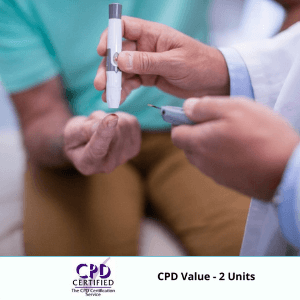Diabetes Awareness
Diabetes is a serious lifelong health condition that occurs when the amount of glucose, or sugar, in the blood is too high. If left untreated, high blood glucose levels can cause serious health complications. There is a lot of confusion around the difference between Type 1 and Type 2 diabetes. Although there are areas in common, the causes, symptoms and management of the conditions differ considerably. This diabetes training for healthcare assistants equip the learner with the knowledge to recognise symptoms and put measures in place to manage diabetes.
Diabetes can develop in anyone at any point in their life although there are certain groups and age ranges where it is more common. There are a range of symptoms that could indicate that someone had Diabetes, these range from excessive thirst to feeling more tired than usual. It is believed that up to 26% of residential and nursing home residents have Diabetes so being able to recognise the symptoms and knowing how you can help them to manage the condition is essential.
- Needing to go to the toilet more frequently
- Becoming extremely thirsty regularly
- Unexplained regular tiredness
- Unexplained weight loss.
- Thrush and/ or genital itching.
- Cuts taking longer than usual to heal
- Blurred, distorted vision.
Who is this course for?
Diabetes training for healthcare assistants course is aimed at people working in the health and social care sector and provides an overview of the condition, the common symptoms that might indicate someone has diabetes, methods of diagnosis, some possible treatments and common complications that can affect those with the condition.
You will learn how diabetes is diagnosed and how blood s tests, known as glycated haemoglobin are used to determine whether someone has diabetes. There are four main complications associated with diabetes and by the end of the course, you will know have some knowledge of how each can affect a person with diabetes:
- cardiovascular disease
- retinopathy – eye disease
- neuropathy, nerve disease
- nephropathy kidney disease
Treatment for Type 1 and Type 2 Diabetes
Anyone who has type 1 diabetes needs lifelong insulin therapy. There are different types of insulin, including rapid acting insulin, long acting insulin, and intermediate options which are examined in the course. Other treatments and lifestyle choices that help control Type 1 diabetes which are discussed in this training are:
- carbohydrate counting,
- frequent blood sugar monitoring,
- eating healthier foods
- exercising regularly and
- maintaining a healthy weight
Each of these are discussed at length to give you, with particular attention given to how different types of food are broken down by the body and how some are more beneficial to managing diabetes than others.
When it comes to specific treatment for type 2 diabetes, the main role of medication is to help lower blood glucose levels. Each form of medication has side effects. So it’s important to be aware of what these are. Diabetes medication needs to be supported with diet changes on regular physical activity. Medication options for type two diabetes include tablets, and injectable medication. Different medications work in different ways so sometimes medications are combined.
You will be introduced to the different forms of medication prescribed for type 2 diabetes, how they work and potential side effects of each.
Hypoglycemia and Hyperglycemia
The course then look at the principles of blood glucose monitoring and the a testing process commonly used, known as bioamperometry. Please note that blood glucose monitoring should only be carried out by someone trained and competent to do so and in line with a diabetes care management plan. Here the course goes through the preparation and process testing using BGM. You are also given guidance on acceptable ranges of a normal blood sugar level and deviations to expect shortly after a meal.
Hypoglycemia is often referred to as low blood sugar, and someone experiencing this may show signs of sweating, pallor, irritability, hunger, lack of coordination, and sleepiness. The immediate treatment for hypoglycemia is to have some sugary food or drink. The course discusses how you should behave when someone in your care suffers a hypoglycemic episode and when you should call 999.
Hyperglycemia is a common problem for people with diabetes. Someone who is hypoglycemic has abnormally high blood glucose levels. They may show signs of increased thirst or dry mouth, weakness, headache, blurred vision, or a need to urinate frequently. If untreated, it can lead to serious medical problems such as permanent damage to the eyes, nerves, kidneys, and blood vessels.
| Course Content | Module |
| Diabetes – What it is and its prevalence | 1 |
| Symptoms, diagnosis & treatment | 2 |
| Complications | 3 |
Course Assessment
Online assessment for this diabetes awareness is carried out by a series of multiple choice questions. Candidates must answer 70% of the questions correctly to pass each module. We advise you to complete each module and answer the question before moving on to the next module. This provides a better learning experience because you will need to have knowledge from earlier modules to understand some of the material in the later modules. For those who complete the course successfully, a PDF certificate of the award is sent directly to your inbox. Hard copies of the award are available on request. The course takes 45 minutes of training to complete. This is course content only and does not cover the time it takes to answer questions.



